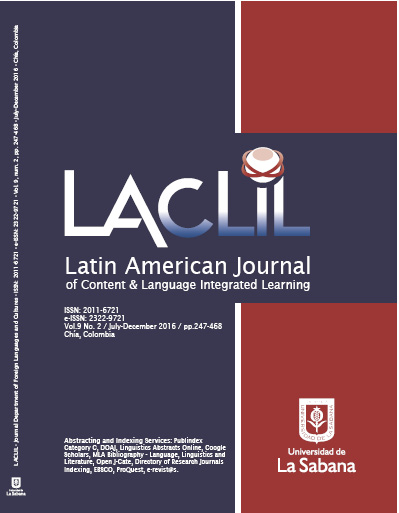Los efectos de la instrucción explícita vs. la instrucción implícita en el dominio del acto de habla de dar las gracias entre estudiantes iraníes de inglés
DOI:
https://doi.org/10.5294/4784Palabras clave:
actos de habla, el acto de dar las gracias, instrucción implícita, instrucción explícita, estudiantes de inglés iraníesResumen
Este estudio de corte pragmático investigó el acto de habla de dar las gracias usado por hablantes no nativos de inglés. El estudio tuvo por objetivo hallar si la conciencia pragmática de los estudiantes iraníes de inglés podría mejorarse a través de la instrucción explícita de la estructura del acto de habla de dar las gracias. De hecho, se pretendió averiguar si hubo una diferencia significativa entre los desempeños de los estudiantes en el uso de este acto de habla cuando se les enseñaron los actos de habla a través de la instrucción explícita y se comparó con la instrucción implícita. Para ello, se seleccionaron treinta estudiantes de inglés intermedio del instituto iraní Pars de lenguas, quienes posteriormente fueron clasificados en el grupo de control y experimental. El investigador usó una prueba de finalización de discurso (DCT) para reunir los datos necesarios en el estudio. Los resultados indican que aquellos estudiantes que fueron instruidos de forma explícita superaron a quienes fueron instruidos de forma implícita.Descargas
Citas
Austin, J. L. (1962). How to do Things with Words. Cambridge, Mass.
Harvard University Press.
Bacelar da Silva, Antonio Jose. (2003).The effect of instruction on pragmatic
development: Teaching polite refusal in English. Second Language Studies, 22(1), 55-106.
Bardovi-Harlig, K. & Hartford, B. (2005). Intercultural Pragmatics: Exploring
Institutional Talk. Mahwah, NJ: Lawrence Erlbaum Associates.
Beebe L.M. & Takahashi T. (1989) "Do you have a bag? Social status and
patterned variation in second language acquisition", in Gass S. M., Madden C., Preston D., and Selinker L. eds. Variation in second 89 language acquisition: Discourse and pragmatics. Clevedon: Multilingual Matters.
Blum-Kulka S., House J., and Kasper G.: (1989), "Investigating cross cultural
pragmatics: an introductory overview", in Blum-Kulka S., House J., and Kasper G. eds. Cross-cultural Pragmatics Requests and Apologies.
Norwood.: NJ Ablex.Bolinger D.L. & Sears D.A. (1981) Aspects of Language.
rd ed. Harcourt Brace Jovanovich.
Cohen A. D. & Olshtain E. (1981). Developing a measure of sociocultural
competence: a case study. Language Learning (31), 113-134.
El Samaty, M. (2005). "Helping foreign language learners become
pragmatically competent", Proceedings of the 10th TESOL Arabia Conference,9.
Eslami-Rasekh Z., Eslami-Rasekh A. & Fatahi A. (2004). "The effect of
explicit meta pragmatic instruction on the speech act awareness of advanced EFL students". TESL-EJ (8), 2. Retrieved from http://www-writing.berkeley.edu/TESl-EJ/ej30/a2.html.
Grice, H. P. (1975). Logic and conversation, in Cole P. and Morgan J. eds.
Syntax and Semantics III: Speech Acts. New York: Academic
Press.
Hassal, T. (1997). Requests by Australian learners of Indonesian. Unpublished
doctoral dissertation, Australian Nacional University, Canberra.
Holmes, J. & Brown, D. F. (1987). Teachers and students learning
about compliments. TESOL Quarterly, 21(3), 523-46.
House, J. (1996), 'Developing Pragmatic Fluency in English as a Foreign
Language: Routines and Meta pragmatic Awareness", Studies in
Second Language Acquisition, 18, pp.225-252.
Kasper, G. (1992). "Pragmatic transfer". Second Language Research, 8(3), 203-
Kasper, G. & Rose, K. R. (2002). Pragmatic development in a
second language. Oxford: Blackwell.
Kasper G. & Schmidt R. (1996). "Developmental issues in interlanguage
pragmatics". Studies in Second Language Acquisition, 18, 149-169.
Manes, J. & Wolfson, N. (1981). The compliment formula. In Florian Coulmas
(Ed.), Conversational routine: Explorations in standardized communication situations and prepatterned speech (pp. 115-132). The Hague: Mouton.
Martinez-Flor, A. & Fukuya, Y. (2005). The effects of instruction on learners’
production of appropriate and accurate suggestions. System, 33(3), 463-480.
Myers-Scotton, C. & Bernstein, J. (1988). Natural conversation as a
model for textbook dialogue. Applied Linguistics, 9, 372-384.
Mey, J. L. (1998). Pragmatics: An Introduction, Oxford UK and Cambridge
USA: Blackwell Publishers.
Morrow, C. K. (1996). The pragmatic effects of instruction on ESL learners’
production of complaint and refusal speech acts. (Unpublished doctoral dissertation). University of New Intercultural Communication Studies XX: 1 (2011)
Rizk, S. (2003). "Why say NO! when you refuse?" TESOL Arabia 2002
Conference Proceedings, 7.
Rose, K. & Ng Kwai-Fun, C. (2001). Inductive and deductive
teaching of compliments and compliment responses. In Kenneth R. Rose, Gabriele Kasper (Eds.), Pragmatics in Language Teaching (pp. 145–170). Cambridge: Cambridge University Press.
Searle, J. R. (1969). Speech Acts: An Essay in the Philosophy of Language.
Cambridge: Cambridge University Press.
Takahashi T. & Beebe L. (1987). "The development of pragmatic competence
in Japanese learners of English", JALT Journal, (8).
Takahashi, S. (1996) "Pragmatic transferability" Studies in Second Language
Acquisition, 18, 189-223.
Tateyama, Y. (2001). Explicit instruction and JFL learner’s use of
interactional discourse markers. In Kenneth R. Rose and Gabriele Kasper (Eds.), Pragmatics in language teaching (pp. 200-222). Cambridge: Cambridge University Press.
Thomas, J. (1983). "Cross-cultural pragmatic failure" Applied Linguistics. New
York: Oxford University Press.
Descargas
Publicado
Cómo citar
Número
Sección
Licencia
Los autores que publican en esta revista están de acuerdo con los siguientes términos:
Esta revista y sus artículos se publican bajo la licencia Creative Commons Atribución-NoComercial-SinDerivadas 4.0 Internacional (CC BY-NC-ND 4.0), por lo cual el usuario es libre de: compartir, copiar y redistribuir el material en cualquier medio o formato, siempre y cuando: dé crédito de manera adecuada, brinde un enlace a la licencia e indique si se han realizado cambios; no use nuestro contenido con propósitos comerciales; y/o remezcle o transforme el material. Recuerde que no tiene los permisos para distribuir el material si fue modificado.








